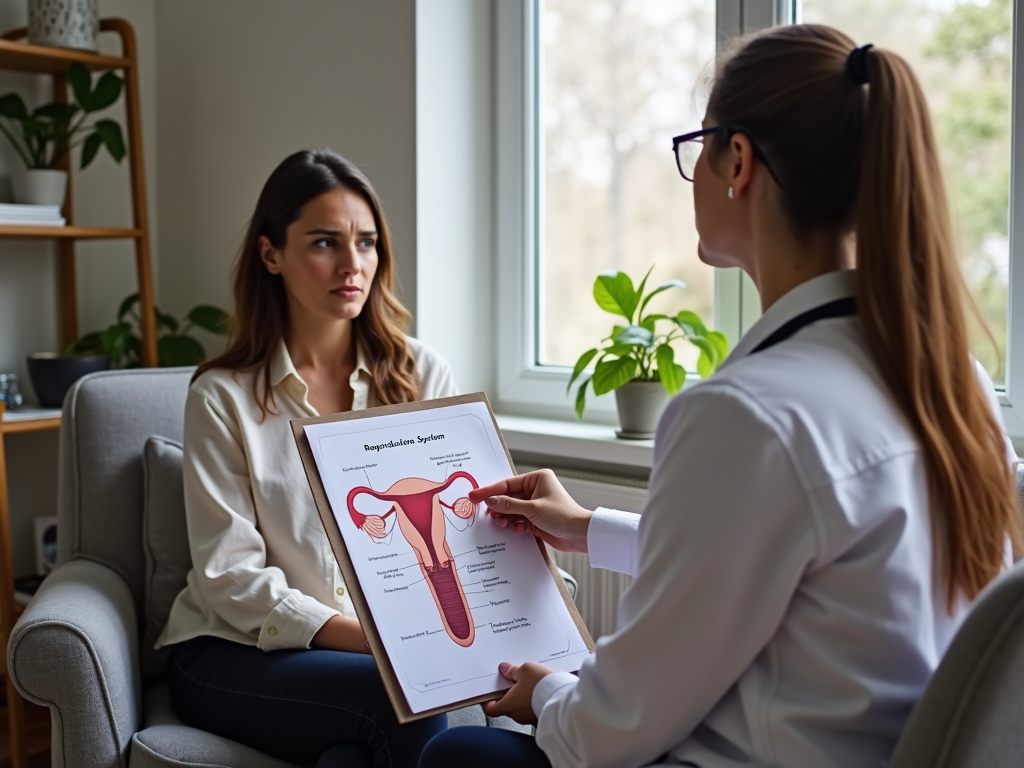Understanding PCOS and its Effects on Fertility
March 17, 2025, 7:51 a.m.
Polycystic Ovary Syndrome (PCOS) is a hormonal condition affecting many women. It causes irregular periods, high androgen levels, and ovarian cysts, often leading to fertility struggles. This article dives into understanding PCOS and its effects on fertility, offering hope and guidance.
PCOS messes with your hormones in a big way. It can make your periods unpredictable, increase hair growth where you don’t want it, and create tiny cysts on your ovaries. Not every woman has all these signs, but they often add up to trouble getting pregnant.
Normally, your ovaries release an egg each month during ovulation. With PCOS, hormonal imbalances throw this off. You might not ovulate regularly—or at all. This unpredictability is why PCOS is a top cause of female infertility.

Take Sarah, for example. At 28, she’d been trying to conceive for over a year. Her periods were all over the place—sometimes months apart. After seeing her doctor, she learned PCOS was behind her ovulation disorders. It was a tough moment, but it started her journey to solutions.
About 6% to 12% of women in their reproductive years have PCOS, says the CDC. That’s millions of people! It’s responsible for around 70% of infertility cases tied to ovulation problems. Knowing this can feel heavy, but it also shows you’re not alone.
So, what are ovulation disorders? They happen when your ovaries don’t release eggs like they should. PCOS is a big player here, but things like thyroid issues can cause them too. The impact of ovulation disorders on fertility is huge—it’s hard to conceive when there’s no egg to meet the sperm.

PCOS doesn’t stop at ovulation. Many women also deal with insulin resistance—where your body doesn’t use insulin well. This can lead to weight gain, which makes symptoms worse. It’s like a cycle that’s tough to break, but not impossible.
Doctors diagnose PCOS with a mix of steps. They’ll ask about your symptoms, check hormone levels with blood tests, and use an ultrasound to peek at your ovaries. It’s key to catch it early because the sooner you know, the sooner you can act.
There’s no magic fix for PCOS, but you can manage it. Losing even a little weight—5% to 10% of your body—can kickstart ovulation again. Eating whole foods like veggies and lean proteins helps too. Small changes can make a big difference.

If lifestyle tweaks aren’t enough, doctors might suggest meds like clomiphene to trigger ovulation. For some, IVF becomes an option. Sarah, from earlier, tried meds and tracked her cycle closely. After months of effort, she got that positive pregnancy test.
The emotional side of PCOS hits hard. Struggling to conceive can bring frustration and sadness. I’ve talked to women who felt lost—like their bodies betrayed them. Finding a support group or a friend to lean on can lift that weight a bit.

Want some steps to try? Here’s a quick list:
- See a doctor who knows fertility.
- Eat balanced meals with less sugar.
- Move your body—think walking or yoga.
- Use apps to track your cycle.
- Ask about supplements like inositol (with doctor approval).
- Relax with deep breathing or meditation.
Every woman’s PCOS is different. What helps Sarah might not work for you. That’s why teaming up with your doctor to create a plan just for you is so important. It’s not one-size-fits-all.

PCOS isn’t just about fertility. It raises your risk for diabetes, heart issues, and even some cancers down the road. Managing it now helps you conceive and stay healthy long-term. It’s a two-for-one deal.
Partners matter too. They can cheer you on, join you at appointments, or cook healthier meals together. One woman told me her husband learned to make PCOS-friendly recipes—it brought them closer through the tough times.
People sometimes think PCOS means no kids. Not true! Many women conceive with help or even naturally. Another myth? Losing weight fixes everything. It helps, sure, but some need more—like meds or IVF—to get there.

Early action is key. If your periods are off or you’re seeing odd symptoms, don’t wait—see a doctor. New research is also uncovering better ways to tackle PCOS, like using genetics to personalize treatments. The future’s looking up.
Here’s a quick rundown of PCOS symptoms and how they hit fertility:
| Symptom | What It Is | Fertility Impact |
|---|---|---|
| Irregular Periods | Cycles too long or too short | Hard to know when you ovulate |
| High Androgens | Extra male hormones | Messes with ovulation |
| Ovarian Cysts | Small sacs on ovaries | Can affect egg release |
| Insulin Resistance | Body struggles with insulin | Worsens hormone issues and weight gain |
PCOS can feel like a mountain to climb, but so many women reach the top. With the right tools—doctors, support, and determination—you can too. It’s about finding what works for you and sticking with it.
In short, understanding PCOS and its effects on fertility opens the door to action. It’s a common condition that complicates ovulation and conception, but help is out there. From lifestyle shifts to medical options, you’ve got paths to explore. Get started early, lean on support, and keep hope alive—you’ve got this.